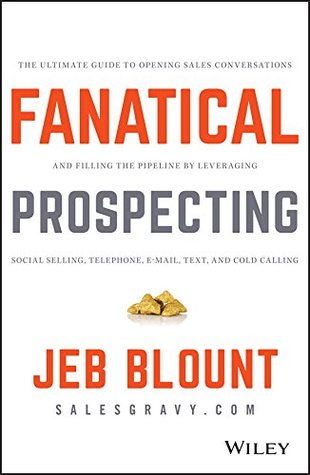More on this book
Community
Kindle Notes & Highlights
by
Jeb Blount
Read between
February 9, 2021 - April 19, 2022
If you invest just an hour a day to make 25 to 50
teleprospecting calls and another hour for e-mail and social prospecting, I can absolutely and unequivocally guarantee that in less than 60 days, your pipeline will be packed.
Prospecting is not for building relationships, selling, or chatting up your buyer. It is for setting the appointment, qualifying, building familiarity, and when it makes sense, moving into the sales process right on the spot. You don't need brilliant scripts. You don't need complex strategies. You don't need to overcomplicate
The most common mistakes are:
Poorly written profiles Incomplete and outdated profiles Unprofessional photo or no photo Extremely opinionated political or religious postings and discussions TMI—too much information about personal issues
It should be well written, compelling, and truthful. Write in the first person and make it conversational. Your bio should explain who you are, what you are all about (values), what you do best, and why customers and clients count on and trust you to solve their problems.
I use a more subtle method. When I publish original content or link to a blog page, I include links to white papers and reports embedded in the content. That tends to generate leads without hurting my reputation. You can use a similar tactic with content that has been generated by your marketing team.
telephone prospecting should get you to yes, no, or maybe as fast as possible, in the least intrusive way, using a relaxed, confident, professional tone that reduces resistance.
goal is to make the call quick and to the point so that you achieve your objective and they can get back to what they were doing.
10 seconds or less—
sound like an authentic professional
consistent, repeatable structure takes pressure off of you and your prospect.
A great analogy for timing your calls is investing. The investor who attempts to time the market has historically failed to beat the investor who uses a dollar-cost-averaging strategy—making incremental investments on a regular schedule over time.
forget about timing your calls and commit instead to a daily, first-thing-in-the-morning call block.
The longer that frog sits there, the more foul it gets. That's when the bargaining starts happening. Instead of just eating it and getting it over with, you start making deals with yourself to “double up” on your frog eating tomorrow.
it's easier to offer platitudes and intellectualize the pain of rejection than to acknowledge that it's real and teach people how to deal with it.
purpose of the anchor statement, sometimes called a ledge, is to give yourself an anchor or something to hold on to until your logical brain catches up, takes over, and manages the disruptive emotions generated by rejection.
“I understand,” you sound just like every other schmuck who uses this phrase as insincere filler so they can get back to pitching. It demonstrates zero empathy and tells your prospect that you are not listening and don't care.
You must ask confidently and assumptively for a specific commitment of time or information, without any hesitation or awkward pause, directly following your turnaround script.
Trust me. I've had prospects scream at me on Tuesday and treat me like I'm their best friend on Wednesday. Completely oblivious to my previous call. That's why, when people tell me to “never call them again,” I call.
The real secret to moving on is understanding that anger is just energy and when you harness that energy, you tap into a powerful force.
Keep e-mail prospecting subject lines super short—three to six words or 40 to 50 characters including spaces. Remember—less is more.
Use action words and directive statements instead of questions. List-based subject lines that include a testimonial like “3 Reasons Why ABC Chose Us” are especially powerful, as are referral subject lines like “Jeb Blount Said We Should Talk” and statement-based subject lines like “Biggest Fail in Industrial Pumps.”
Connect your subject line to an issue your prospect is facing—especially if it is emotional or stressful—or compliment them on a recent accomplishment or something that you know makes them feel proud. For example, the easiest, fastest way to get me to open your e-mail is a subject line that reads: “Loved Your Book!”
Sales e-mail prospecting, automation, and intelligence services like Yesware, Tellwise, Tout, and Signals give you instant insight into what happens with your prospecting e-mail after you push “send.”


